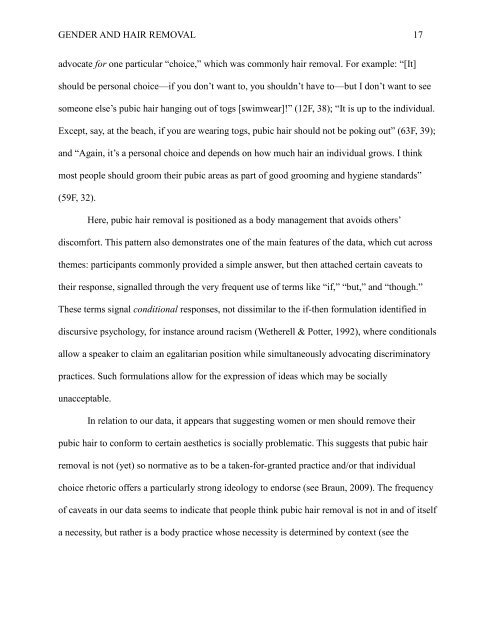Braun, V. , Tricklebank, G. and Clarke, V. (2013) It shouldnt stick out ...
Braun, V. , Tricklebank, G. and Clarke, V. (2013) It shouldnt stick out ...
Braun, V. , Tricklebank, G. and Clarke, V. (2013) It shouldnt stick out ...
You also want an ePaper? Increase the reach of your titles
YUMPU automatically turns print PDFs into web optimized ePapers that Google loves.
GENDER AND HAIR REMOVAL 17<br />
advocate for one particular “choice,” which was commonly hair removal. For example: “[<strong>It</strong>]<br />
should be personal choice—if you don’t want to, you shouldn’t have to—but I don’t want to see<br />
someone else’s pubic hair hanging <strong>out</strong> of togs [swimwear]!” (12F, 38); “<strong>It</strong> is up to the individual.<br />
Except, say, at the beach, if you are wearing togs, pubic hair should not be poking <strong>out</strong>” (63F, 39);<br />
<strong>and</strong> “Again, it’s a personal choice <strong>and</strong> depends on how much hair an individual grows. I think<br />
most people should groom their pubic areas as part of good grooming <strong>and</strong> hygiene st<strong>and</strong>ards”<br />
(59F, 32).<br />
Here, pubic hair removal is positioned as a body management that avoids others’<br />
discomfort. This pattern also demonstrates one of the main features of the data, which cut across<br />
themes: participants commonly provided a simple answer, but then attached certain caveats to<br />
their response, signalled through the very frequent use of terms like “if,” “but,” <strong>and</strong> “though.”<br />
These terms signal conditional responses, not dissimilar to the if-then formulation identified in<br />
discursive psychology, for instance around racism (Wetherell & Potter, 1992), where conditionals<br />
allow a speaker to claim an egalitarian position while simultaneously advocating discriminatory<br />
practices. Such formulations allow for the expression of ideas which may be socially<br />
unacceptable.<br />
In relation to our data, it appears that suggesting women or men should remove their<br />
pubic hair to conform to certain aesthetics is socially problematic. This suggests that pubic hair<br />
removal is not (yet) so normative as to be a taken-for-granted practice <strong>and</strong>/or that individual<br />
choice rhetoric offers a particularly strong ideology to endorse (see <strong>Braun</strong>, 2009). The frequency<br />
of caveats in our data seems to indicate that people think pubic hair removal is not in <strong>and</strong> of itself<br />
a necessity, but rather is a body practice whose necessity is determined by context (see the

















